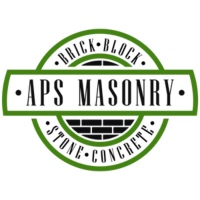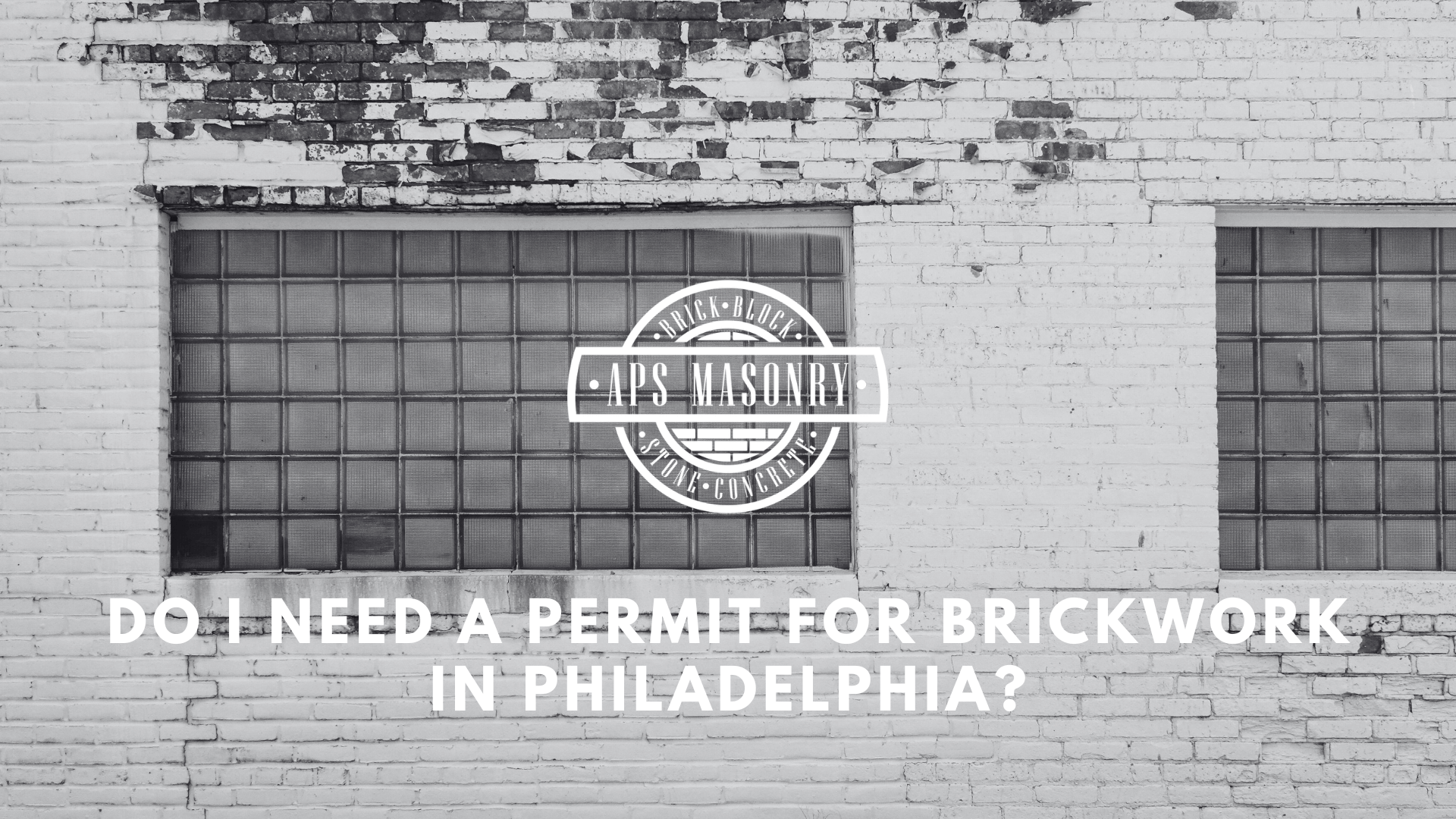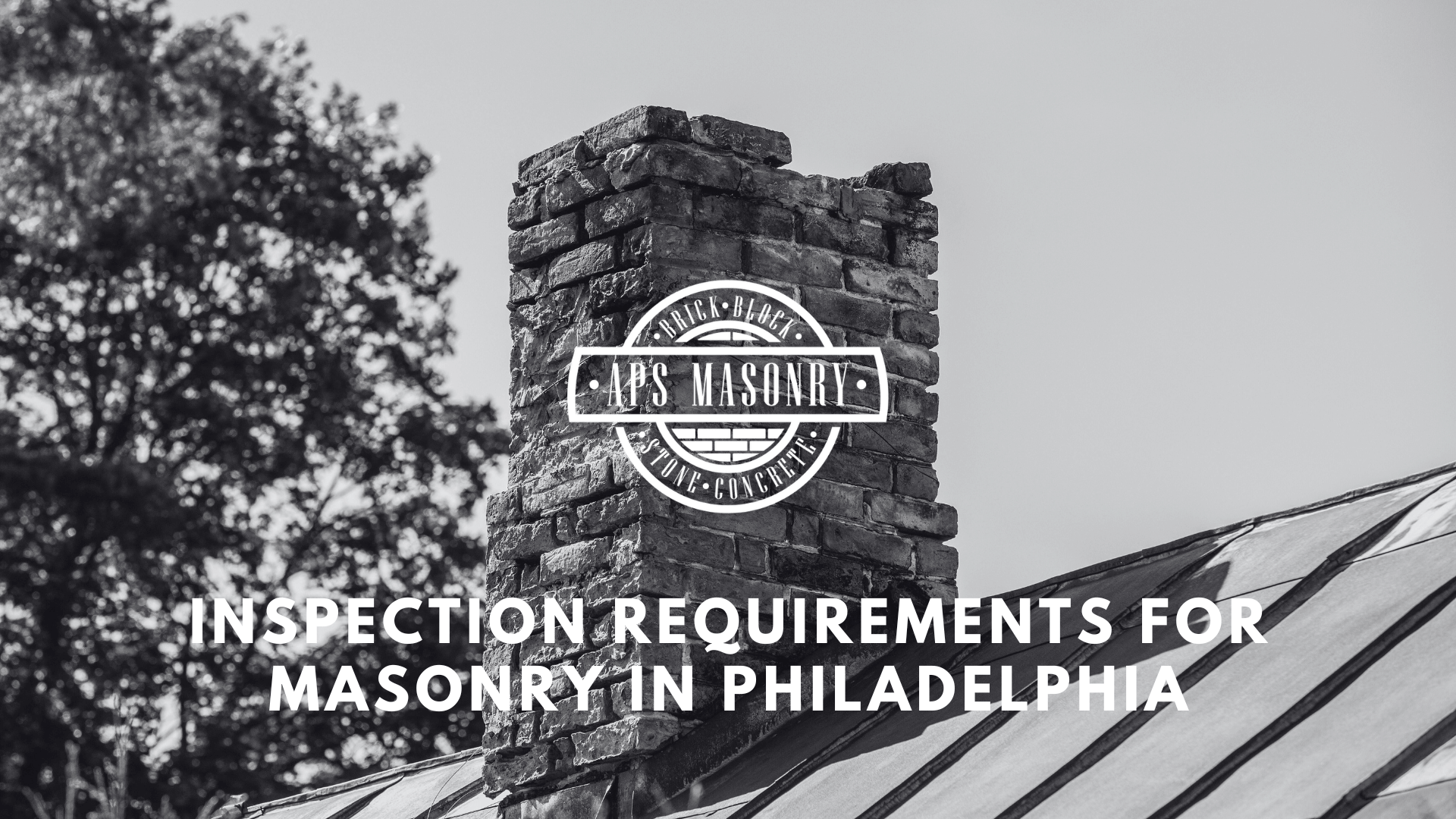Do I Need a Permit for Masonry in Philadelphia?
Getting masonry work done in Philadelphia isn’t as simple as hiring a contractor and breaking ground. If you're building steps, repairing a facade,...
7 min read
 Alec Serowatka
:
Jul 9, 2025 9:11:00 AM
Alec Serowatka
:
Jul 9, 2025 9:11:00 AM

Avoid fines, delays, and red tape—APS Masonry Contracting handles your Philadelphia brickwork permits so you don’t have to.
Philadelphia homeowners are often surprised to learn that even simple brick repairs can require a building permit. From rebuilding front steps to repairing retaining walls or altering a brick façade, knowing what qualifies as a minor repair versus a structural change matters. Skip the wrong step, and you could face fines, delays, or project shutdowns.
At APS Masonry Contracting, we deal with the permit process the right way—so your brickwork is code-compliant, structurally sound, and ready for inspection.
Most brickwork projects in Philadelphia do require a building permit, especially when they involve structural changes, exterior modifications, or affect the existing structure of your home. If you're patching up a few bricks or repointing mortar, you're likely safe—but as soon as you're rebuilding walls, steps, or touching anything that impacts your home’s integrity, a permit application becomes mandatory.
Philadelphia’s permit requirements are governed by the Philadelphia Code and the Pennsylvania Construction Code Act, which outline what kinds of work fall under ordinary repairs versus regulated construction. Skip the paperwork, and you're exposing yourself to fines, red tags, or worse—forced demolition of unpermitted work.
Some basic repairs fall into the category of ordinary repairs and don’t require a building permit or zoning permit. For example:
Repointing or tuckpointing: Replacing deteriorated mortar without affecting the structure.
Replacing a few bricks: If damage is minimal and you're not altering the existing wall surfaces or any structural beam, you’re usually in the clear.
Window replacement: Swapping out windows that don’t alter the shape or size of the opening may avoid triggering permit needs.
However, if your home is on the Philadelphia Historic Registry or located in a regulated zone, even minor work may require a permit application and zoning review. That’s where APS can step in to review the scope and ensure full compliance.
Philadelphia’s Department of Licenses and Inspections (L&I) requires a building permit for most brickwork projects that go beyond minor repair. If you're planning anything that touches the structure, appearance, or safety of your home or property, it likely falls under the city's permit requirements.
Here’s when a permit application is mandatory:
Rebuilding a structural beam, altering the existing structure, or removing and reinstalling an exterior wall
Projects that change load-bearing brick components
Replacing more than 25% of existing wall surfaces, especially on commercial building facades or two family dwellings
These projects require not only a building permit, but may also be subject to zoning review and compliance with the international building code.
Constructing or modifying retaining walls higher than two feet
New brick garden walls, boundary structures, or walls near property lines
These often require both a zoning permit and related permits for site work.
Any work on homes listed on the Philadelphia Historic Registry
Even ordinary repairs (like repointing) on these properties may require approval from the Historical Commission and full permit issuance
Brick repairs or replacements on commercial construction or commercial building sites must follow full permitting protocols
Additional safety reviews for exit access corridors, accessible route design, or compliance with energy code compliance standards
Work in flood hazard areas requires additional reviews
Permits are mandatory when modifying service systems, affecting plumbing installation, or adding electrical equipment
Brick installations related to fixtures related to mechanical systems
Window replacement that changes framing or dimensions
Work involving electrical wiring, electrical work, or approved electrical or approved portable electrical equipment
Any structure involving temporary system support, shade cloth structures, or even temporary motion picture installations on brick backdrops
All of these scenarios mean you’ll need a licensed permit holder (like APS) to submit the proper documentation through the Municipal Services Building, or as an authorized agent for the property owner.
In Philadelphia, the cost of a building permit for brickwork projects is determined based on the scope and nature of the work:
Alterations and Repairs (including EZ Permits):
For one- and two-family dwellings:
$76 for the first 500 sq. ft.
$56 for each additional 100 sq. ft. over 500
For other occupancies:
$253 for the first 500 sq. ft.
$60 for each additional 100 sq. ft. over 500
New Construction:
$1,328 for one- and two-family dwellings
$253 for the first 500 sq. ft., plus $73 for each additional 100 sq. ft. for other occupancies
Additional fees may apply for services such as accelerated plan reviews, amendments, and reinstatements.
You can apply for permits through the City of Philadelphia Permits, Violations and Licenses department. There are many types of permits required so we strongly recommend contacting professionals to help you ease through the process.
Don’t risk code violations—APS handles every step of the permit process, from review to inspection. Contact us for a free evaluation of your project.
The building permit application process in Philadelphia is detailed, often technical, and—if you're not prepared—frustratingly slow. The Department of Licenses and Inspections (L&I) requires exact documentation, strict adherence to local and state codes, and depending on your project scope, approvals from multiple departments.
Here’s what the average homeowner can expect:
Most brickwork projects aren’t one-permit jobs. You may need:
A building permit for structural work
A zoning permit if you’re altering the footprint of the property
Individual permits for any plumbing installation, electrical work, or heating or cooling equipment that interacts with your project
Miss one? The city won’t process your application—or worse, they’ll issue a stop-work order.
The standard building permit application asks for more than just project details. If you’re a natural person (i.e., an individual homeowner), you’ll need to include:
A full project description, including any structure affecting changes
Names and addresses of owners or those with financial interest
Plans or documents showing how your work complies with code
If you’re not submitting as the property owner, you must be listed as an authorized agent, or the application may be rejected outright.
Philadelphia uses the eCLIPSE online system for all permit applications. If it’s your first time navigating this platform, expect a learning curve. Upload errors, misfiled documents, or system flags for missing related equipment (like a new drain near a retaining wall) will delay your application.
After submission, it can take days—or weeks—for the city to review. If your application is incomplete or unclear, it’ll be sent back for corrections. Each round of feedback means more time, and potentially rescheduling contractors. If any part of your work is flagged as equipment unsafe, you won’t receive permit issuance until it's resolved.
Most homeowners don’t want to deal with back-and-forths from L&I, deciphering the Philadelphia Code, or coordinating between the Pennsylvania Department of Environmental Protection and city zoning.
APS Masonry Contracting:
Handles the building permit application from start to finish
Identifies every required permit before work begins
Coordinates with city officials as your authorized agent
Prevents costly delays by getting it done right the first time
We know what triggers reviews, how to get fast responses, and how to keep your brickwork compliant, inspected, and on schedule.
Philadelphia's Department of Licenses and Inspections (L&I) offers EZ Permits for certain straightforward construction and renovation projects, including specific types of brickwork. These permits streamline the approval process by eliminating the need for detailed architectural plans, allowing homeowners and contractors to commence work more swiftly.
Your brickwork project may be eligible for an EZ Permit if it meets the following criteria:
Non-Structural Facade Replacement: Replacing or altering a non-load-bearing masonry wall on a one-family dwelling, limited to buildings not exceeding three stories or 35 feet in height.
In-Kind Repairs: Performing repairs that do not change the structural integrity or appearance of the building, such as repointing or replacing damaged bricks with matching materials.
No Expansion Beyond Existing Footprint: Ensuring that the new facade does not extend beyond the existing building foundation wall.
Compliance with Building Codes: Adhering to the 2018 International Building Code (IBC) and the 2015 City of Philadelphia Residential Code (IRC).
It's important to note that properties listed on the Philadelphia Register of Historic Places are not eligible for the EZ Permit process.
An EZ Permit cannot be used for brickwork projects that involve:
Structural Changes: Altering load-bearing walls or structural components.
Facade Extensions: Extending the new facade beyond the existing building foundation.
Anchoring to Non-Masonry Walls: Attaching new masonry facades to non-masonry walls.
Relocation of Exterior Doors: Moving exterior egress doors to alternate locations.
Installation of Bay Windows: Adding bay windows to the structure.
In such cases, a standard building permit with submitted plans is required.
Zoning Permit – Required if the project changes the footprint, use, or setbacks of a property (e.g., new retaining walls or brick fences on property lines).
Plumbing Permit – Needed if your brickwork project affects underground drainage, sewer cleanouts, or access points (common near walkways and retaining walls).
Electrical Work – If lighting, security systems, or power outlets are integrated into brickwork or masonry columns, this requires a permit for electrical work or electrical wiring.
Related Permits – May apply when working on two family dwellings, commercial construction, or affordable housing projects, especially if your scope involves fixtures related to mechanical or structural systems.
APS doesn’t guess—we know when you need a building permit, a zoning permit, or a stack of related permits. We’ve worked across neighborhoods like Fishtown, Queen Village, and Mt. Airy, and we understand the rules that govern each property type—from one or two family homes to commercial construction sites.
From the first permit application to final permit issuance, APS manages every step. Our team acts as your authorized agent, filing paperwork, managing inspections, and ensuring compliance with the Pennsylvania Construction Code Act, international building code, and energy code compliance standards.
APS is a licensed contractor with years of experience in Philadelphia’s most challenging masonry projects—from restoring exterior walls in historic homes to safely replacing structural beams in homes showing decades of wear. We don’t just build—we restore trust in your property’s integrity.
Saving time, avoiding costly mistakes, and protecting your investment starts with one smart decision—handing the permit process off to professionals who know it inside and out. At APS, we take care of every form, code requirement, and city inspection so you don’t have to waste hours meddling with bureaucracy or risk delays from incomplete applications. Let us handle the headaches—so you can focus on the finished product, not the paperwork that gets you there.

Getting masonry work done in Philadelphia isn’t as simple as hiring a contractor and breaking ground. If you're building steps, repairing a facade,...

For most Philadelphia building owners, masonry inspections feel like just another line item—another fee, another delay, another department asking for...

Considering a bathroom remodel? Don't overlook the importance of permits. They're not just red tape; they're your assurance of safety, legality, and...